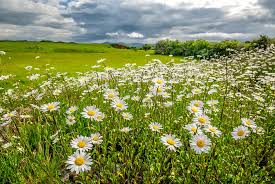
Thursday
Paris Review has just published a newly-discovered Lucille Clifton poem that the country needs right now given continuing police and vigilante killings of African Americans. I can’t find the lyric in her Collected Poems so I don’t know how the editors chanced upon it. I’m thinking it was written in the 1990s since it mentions the deaths of Clifton’s husband and parents but not of the two children she lost in the 2000s.
I love her use of the word “spray” since it captures both how she has been sprayed by loss, as though by a spray gun, and how she has gathered those losses into a spray or cluster of flowers. Pain has been transmuted into beauty:
i have gathered my losses
into a spray of pain;
my parents, my brother,
my husband, my innocence
all clustered together
durable as daisies.
That she chooses daisies is no surprise. In her first collection (good times, 1969), she shows a preference for brightly colored weeds over “calm family flowers”:
flowers
here we are
running with the weeds
colors exaggerated
pistils wild
embarrassing the calm family flowers. Oh
here we are
flourishing for the field
and the name of the place
is Love
Regarding durability, I wrote recently about how it is a continuing theme for Lucille. I concluded that essay with her lines,
other people think they know
how long life is
how strong life is.
we know
In these trying times, we must draw on any reserves of strength we possess, even while never losing sight of life’s flowers.
Update: My former colleague Michael Glaser, who edited Collected Poems, says that commercially-imposed time restraints meant he was unable to track down all of Clifton’s unpublished poems before the publication deadline. He speculates that “i have gathered my losses” may appear in a forthcoming selection of Clifton poems, entitled How to Carry Water, which contains ten previously unpublished poems.
Further thought: Clifton’s flower imagery brings to mind the Slovenian novel The Self-Sown (1941) by Prežihov Voranc. An Austrian noble family attempts to end an affair between their son and a Slovenian peasant girl, even torturing her with fire at one point. In the end, however, her offspring flourish like wild flowers (thus the title) while the Austrian line withers away. Those not born to privilege prove to be as durable as daisies.

